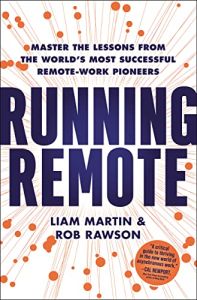
Running Remote
Master the Lessons from the World’s Most Successful Remote-Work Pioneers
Recommendation
Beginning in 2019, the COVID pandemic forced many companies to go remote in ways their leaders once thought impossible. While some stumbled, and some companies are now requiring staff members to return to the office, at least on a hybrid schedule, other firms embraced working from home. Consultants Liam Martin and Rob Rawson offer experienced guidance about the ins and outs of remote work. They find that having a remote workforce requires leaders to adopt an “asynchronous” mindset that empowers employees with true autonomy. Remote workers may miss out on in-person collaboration and on some promotion opportunities that require being in the office, but they gain flexibility, time for individual deep work, heightened online skills, and often, greater productivity and growth.
Summary
About the Authors
Liam Martin and CEO Rob Rawson co-founded Time Doctor.com which offers time and productivity tracking for remote teams.




















Comment on this summary